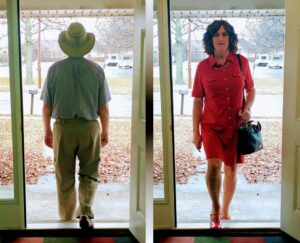For context, you should know a little bit about me. I am an active member of The Church of Jesus Christ of Latter-day Saints. I also happen to be a transgender woman, having transitioned full-time as of January 1, 2019 at the age of 54. I am a widowed parent of 5 children and grandparent of 6 grandchildren. My wife and I were married for 34 years until she passed away in April of 2016. I’ve been in my ward for almost 30 years, and I feel very lucky that my congregation has been welcoming and inclusive after my transition. There are some institutional issues, but the members of the ward are far more important to me than a set of policies and rules that could change at any time.
I decided to write this about a month ago after our November Relief Society dinner/social. The interactions that night presented to me a reminder and lesson about how to be inclusive of our LGBTQIA+ siblings, especially in an LDS setting. It also allowed me to provide a glimpse into the mental gymnastics a member of the LGBTQIA+ community performs while interacting in a predominantly cisgender heteronormative culture. Even when we are certain that we are welcome and included, there are still all kinds of subtle aspects to our interactions that can give everyone pause. Some might term these micro-aggressions, even when entirely unintentional.
Here’s the story. I hope it is enlightening and instructive.
———————————————————
Something interesting happened on Thursday night. It was a good thing. Whatever impression you get of what I write below, don’t think that it wasn’t. At the same time, it gave me an opportunity to reflect and provided basis for a little essay about interaction with LGBTQIA+ people.
I was at church at a Relief Society dinner. There were five women at my table, three of whom I think are somewhere around half my age. Talk turned to how we met our spouses. One had been married for about 2 years, two of them for about 5 years, one (closer to my age) had been married for a while in a second marriage, and I had been married for 34 years and am now widowed.
As this conversation proceeded, thoughts were running through my head. Everyone else at the table was asked “how did you meet?” I was wondering if I would be asked at all. And if I was asked, what form would the question take? After everyone else at the table had shared, I was asked “Valerie, if you’re comfortable sharing, how did you meet?”
I said “sure.” Then I proceeded to talk about how my wife and I met.
But I didn’t really just say “sure” and start talking. There was a whole conversation in my head before I even said that word, though there was no apparent hesitation. The first thing I thought was that the phrase “if you’re comfortable” had only been used with me. There was nothing wrong with this and I think it was very thoughtful, but I couldn’t help noticing that it was different.
The second thought that went through my head was that I am comfortable talking about it even though I am the only person at the table who would be talking about having met a wife rather than a husband.
The third thought that went through my head was that I’m usually more concerned about the discomfort of those to whom I am speaking. I am still certain that the “gifts” that testosterone gave me throughout the first half century of my life make it quite apparent that I am a transgender woman, so I don’t think anybody is going to be surprised if I talk about my wife. Still, I don’t know how someone will react in that setting. There was only one person at that table with whom I had previously had a conversation about their comfort with members of the LGBTQIA+ community. I’m always a little bit hesitant.
That hesitance is not unique to me. It is a rather common issue during these types of conversations when most of these conversations involve cisgender heteronormative relationships. No one even thinks twice when a woman talks about having met her husband or about any other topics where their spouse gets mentioned. It is less common to hear a man talk about his husband, a woman talk about her wife, or for anyone to use non-gendered terms like spouse or partner.
This casual talk about our relationships is all part of bringing one’s whole self into conversations and social situations. This is where many members of the LGBTQIA+ community feel anxious about how their participation will be perceived by others. Sometimes it can be a question of one’s own safety, whether that is physical safety or emotional safety.
The fourth thought was to consider how the words I used might affect those around me.
And the fifth thought was to chide myself for assuming that the “comfortable” phrase had anything to do with my being transgender. It very well could have been because I was the only person at the table not currently married to a living spouse. It may have been phrased that way to respect my status as a widow.
All of that occurred between the time I was asked if I was comfortable sharing and my response that I was.
I then proceeded to talk about having met in Sunday School when we were 14 and eventually getting married at 18. Not once did I use the word wife or refer to her gender. I used the word “we” and spoke in other generic terms. Why? Emotional safety. I don’t know all the other people at the table well or their thoughts regarding the LGBTQIA+ community. There is my ongoing concern about other people’s comfort. There is my underlying hope and wish that the language I use does not cause them to see me as a man. That latter one is difficult. While I’m comfortable being known as a transgender woman, I would prefer that I was simply always perceived as a woman. Again, thanks testosterone.
You may wonder what I want you to take away from this little narrative. I think it’s this. When you’re having conversations with a group of people and you know that some are cisgender while others are transgender, or you know that some are heterosexual while others are gay or lesbian, or you’re simply vaguely aware of someone’s different sexual orientation, gender identity, or marital/partnership status, just speak to everyone the same way (unless you happen to be discussing topics specifically about sexual orientation, gender identity, etc.).
Engaging everyone in the same way creates that sense of belonging. There’s a difference between acceptance and belonging. Acceptance is what happens when someone is invited in, but actions and conversation still suggest or even highlight differences. Belonging is what happens when someone is invited in and their differences, while acknowledged, are not emphasized. It’s when everyone’s differences are treated as normal.
If you choose to show your love and acceptance for others by including them, please remember that it’s not just including them… it’s also the way in which you include them. Include them in such a way that you tell them that they belong.
Valerie is a pickle connoisseur who anxiously avoids Last Christmas by Wham! while waiting for tennis season to begin. Her hobbies include spontaneous science experiments (remember: only 1 variable at a time) and TikTok videos.







7 Responses
“Belonging is what happens when someone is invited in and their differences, while acknowledged, are not emphasized. It’s when everyone’s differences are treated as normal.” Thank you for writing out the internal conversation you had before you participated in the group discussion. It is helpful to know how a perceived attempt to be sensitive to difference may preclude belonging.
Thanks for this, Valerie! I appreciate you showing the mental calculus behind all of the language that you use in describing your experience and how cis-het folks just never have to jump through these hoops in the hope of avoiding judgement. I have had some folks close to me recently go through a gender transition and have had to start doing some of this language hoop-jumping in unaffirming spaces and WOW is it a minefield that requires a lot of skill and forethought.
Thank you Valerie. I always appreciate what you have to say.
Thank you, Valerie! You are truly doing holy work. <3
Thank you for the tip! It is so helpful to hear your perspective.
Thanks for sharing this, Valerie. It’s so helpful to me to have you share some of your internal dialogue and the issues you have to consider.
Thank you for sharing this. It is helpful to me as the mother of a gay son. I am always working on learning not only how to love and accept– that’s easy– but how to do it all in the BEST way possible.